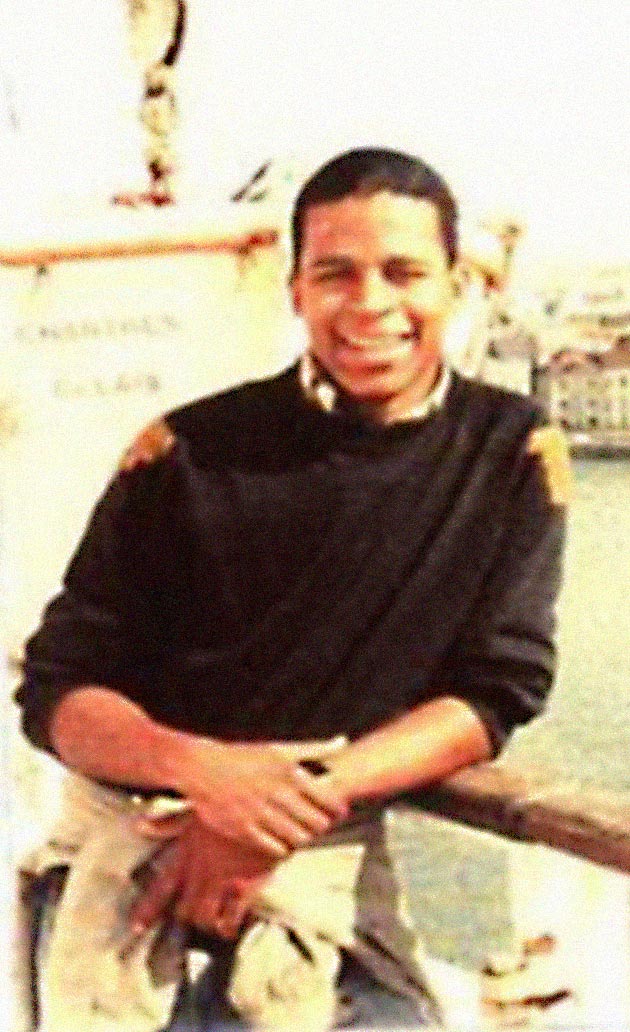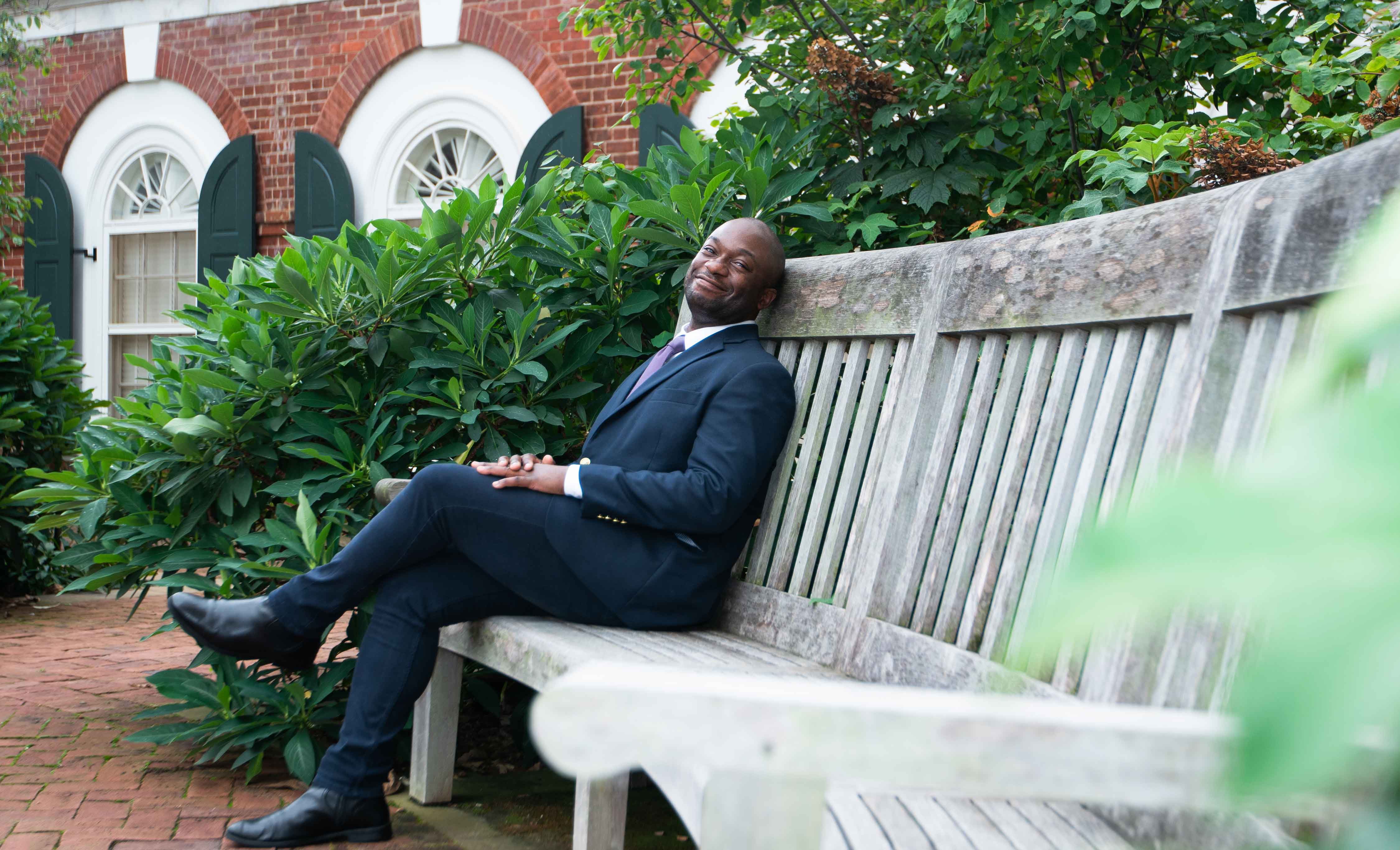A Wide and Expressive Journey

As students at UVA, when there were hard days on Grounds or hard days in the world, we would look around at the architecture, the perfect sphere within perfect cubes and the multiple orders of columns. And we would think, okay, we can do this. We know who we are. There are higher values here that came before us and will outlive us, and we have a duty and the responsibility to be young, to question, but also to listen and to engage. For all of our ancestors, and for all of the counselors and teachers and mentors and family members who got us here, the best thing we can do is give our all for one more day. That spirit, that ethos, is deeply pervasive in my memories of being a student at UVA.
—Horace Ballard (Col ’06)
Recipient of the Ravenell (Ricky) Keller III
Scholarship Award
^ Horace Ballard defied his family's wishes when he applied to the University. He received the Ravenell (Ricky) Keller III Scholarship Award to participate in the UVA in Oxford program as an undergraduate.

Ravenell (Ricky) Keller III was known for his giving spirit and his laughter. An award created in his memory allows African American students to study abroad.
Before his death at age 33, Ravenell “Ricky” Keller III (Col ’85) wrote his own obituary. He reflected on his love for his family and his experiences as a child actor, which included performing at a state dinner for President Jimmy Carter and first lady Rosalynn Carter and a small role in the film “Being There.” He also recalled his time at UVA. “My college years at the University of Virginia are also remembered with fondness,” he wrote. “While at the University of Virginia, I established what seemed like hundreds of friendships.” Keller was a member of Kappa Alpha Psi, the IMP Society, the University Guide Service, and the Board of Trustees for the class of 1985. After his death, it was revealed that he was also a member of the Seven Society—the first known African American member.
Ricky exuded goodness. We were University guides together and then analysts at Morgan Stanley. In both endeavors, Ricky was remembered for bringing out the best in others and of course his famous laugh. His was a deep-in-the-belly, uproariously loud, not-to-be-forgotten, completely contagious laugh. I can’t recall a single encounter when seeing Ricky didn’t make my day immeasurably brighter.
John Griffin (Mcintire ’85)
member, Board of visitors
Keller's many friends and loved ones created the Ravenell (Ricky) Keller III Scholarship Award in his memory. The award provides a one-time grant to African American students to supplement a study abroad experience during a semester, summer, or J-term.
Keller studied at the London School of Economics during his time at UVA. He lived on the Lawn and graduated with honors. As a student, he received the First Year Academic Achievement Award, the Afro-American Scholars Award, the Fraternity Leadership Achievement Award, the John Kenneth Crispell Memorial Award, and graduated with honors.
“[T]he [award] that was most meaningful to me was my selection for the John Kenneth Crispell Memorial Award at the University of Virginia,” he wrote. “Crispell was the son of a teaching physician at the University who tragically drowned. In remembrance of him, a scholarship memorial was established to recognize a fourth year student leader who exemplified academic excellence and a ‘love of life.’ I do love life.”
After graduation, Keller interned at the Morgan Stanley investment firm in New York before beginning graduate work at Harvard University. In 1989, he returned home to Washington, D.C., where he lived until his death. “My major priorities are what I characterize as my most abundant blessings,” he wrote. “I am blessed with many friends, a loving family, a very comfortable home surrounded by greenery, water and nature, opportunities to serve less fortunate people through numerous volunteer activities, a rich spiritual life, and a generally exceptional quality of life.”

^ As the curator of American art for the Williams College Museum of Art, Horace Ballard helps his students see the connections between visual culture, history, social justice, and their own stories.
Horace Ballard (Col ’06), curator of American art for the Williams College Museum of Art, received the Keller Award as an undergraduate double major in English and American studies. Ballard has a master's degree in religion from Yale Divinity School and a doctorate in American visual culture and American studies from Brown University. His path as a scholar of history and culture included jobs at Monticello, the Yale University Art Gallery, the Museum of Art of the Rhode Island School of Design (RISD), and the Birmingham Museum of Art. “It has been a journey that has been wide and expressive,” he said.
A Ridley Scholarship gave Ballard the opportunity to attend UVA, though he had to defy his family's wishes to apply. “But then I took a UVA tour. And I looked back at family photos and saw that even in moments that my family remembered—and rightfully so—as very hard, I saw myself running across the Colonnades. I saw myself running across the Lawn and in the gardens. I had such great memories of coming back to Virginia, no matter where we were living, in the summers. Charlottesville was home. And so, I applied early decision. I found out I got in on Dec. 4, 2001, and the next day I learned that I was going to be offered the Ridley Scholarship.”
Some of Ballard's maternal cousins were on the janitorial staff on Grounds while he was a student. “I think in time they were not just delighted but deeply proud that they knew me. Every day across my four years, I realized that there were family and friends on Grounds looking out for me,” he said. “I also realized what my duty and responsibilities were. To graduate on time. To follow my passions. To leave the University stronger than I found it. To be a part of every club I could.” Ballard was a member of the University Guides and the Jefferson Literary and Debating Society. He was the head resident at Brown Residential College and ran the coffeehouse in Tuttle.
The Keller Award allowed Ballard to attend the UVA at Oxford program the summer between his third and fourth years, a pivotal moment in affirming his identity as a scholar. “It was the first time I felt smart,” he said. “I knew how to synthesize information. I knew how to digest it and distill it back in a 5-, 10-, 15-, or 25-page essay. I knew how to read for comprehension. But no one had ever taught me how to contribute to an intellectual discussion or dialogue in one’s field. And that program gave that to me.” Ballard recalled with emotion the faith that three UVA mentors—Grace Hale, Lotta Lofgren, and Franny Nudelman—had in his potential as a scholar. “These women changed my life. After I came back from Oxford, they told me that I owed it to the stories I wanted to tell to find some way to keep writing and to stay in an academic and scholarly context,” he said. “Franny told me that if I worked hard, I would be a fantastic mentor to other queer Black students one day.”
“The University of Virginia has given me so much,” Ballard said. “The Ridley Scholarship emboldened me to stand up to generations of history and say, ‘I am going to choose UVA for me because it is the best place for me.’ The Keller Award allowed me to discover my voice on the world stage. As an alumnus, UVA continues to give me experiences that challenge me, that are joyous, and that allow me to say to other young people, ‘I know you can do this because you have me in your corner to help you.’”

